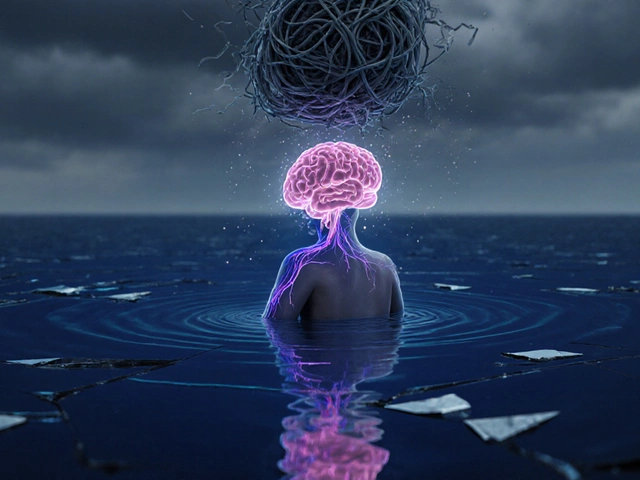Mental Health Therapy: Simple Answers for Real Life
Feeling stuck, anxious, or just plain overwhelmed? You’re not alone. Millions turn to mental health therapy each year to clear the fog and get back on track. Below we break down what therapy actually looks like, why it matters, and how to pick the right help for you.
What is Mental Health Therapy?
Therapy is a conversation with a trained professional who helps you understand thoughts, feelings, and habits. It isn’t just “talking about your day” – it’s a focused, goal‑oriented process that uses proven techniques to change patterns that hurt you.
There are many flavors. Counseling often deals with specific problems like grief, relationship issues, or a stressful event. Psychotherapy digs deeper, looking at long‑standing beliefs and how they shape your life. Both can be short‑term (a few weeks) or long‑term (months or years) depending on what you need.
Key benefits you’ll notice quickly are:
- Reduced anxiety or panic attacks
- Clearer thinking when making decisions
- Better sleep and less chronic stress
- Improved relationships, because you learn healthier communication
Research from Indian medical colleges shows that even brief weekly sessions can lower blood pressure and improve overall well‑being. So therapy isn’t just “mind stuff” – it can affect your physical health too.
Choosing the Right Support
Not every therapist is a perfect fit. Here’s a quick checklist to help you decide:
- Credentials: Look for a licensed psychologist, psychiatrist, or certified counselor. In India, check registration with the Rehabilitation Council of India.
- Specialty: If you’re dealing with depression, find someone who lists mood disorders as a focus. For trauma, seek a therapist trained in EMDR or trauma‑focused CBT.
- Approach: Some use talk‑only methods, others combine mindfulness, art, or movement. Ask what tools they use and try a short intro session to see if it feels right.
- Cost & Access: Many clinics offer sliding‑scale fees. Online platforms can be cheaper and fit a busy schedule. Check if your insurance covers mental health visits.
- Comfort level: Trust your gut. If you feel judged or uneasy, it’s okay to try another professional.
Our own article "Counseling vs Therapy: Understanding the Key Differences and Choosing What's Right for You" goes deeper into these nuances, and "How to Know If You Need Counseling or Therapy" lists practical signs you might need help now.
Once you start, give it a few sessions before deciding if it works. Change takes time, but most people notice a shift in mood or stress level within the first month.
Remember, seeking therapy is a sign of strength, not weakness. It’s the same as seeing a doctor for a sore knee – you wouldn’t ignore physical pain, so don’t ignore mental pain either.
If you’re ready to try, search for “mental health therapist near me” or explore reputable online services that list Indian‑based professionals. Take the first step today; your future self will thank you.

What is the Hardest Mental Illness to Live With? Real Challenges, Real Stories
Living with a mental illness can flip your world upside down, but some conditions make daily life especially tough. This article breaks down why certain mental illnesses like schizophrenia, borderline personality disorder, and severe depression are so challenging. You’ll get real-world stories, facts that might surprise you, and straightforward advice to make each day a bit easier. From dealing with the stigma to tips that make a difference, you’ll walk away understanding more—and maybe feeling a little less alone. We’ll keep it honest, practical, and as relatable as talking to your best friend.

Discovering the Most Effective Therapy Techniques for Mental Health
Therapy plays a crucial role in improving mental health and finding the right type can dramatically alter an individual's well-being. This article explores various therapy techniques and their effectiveness in treating mental health issues. Readers will gain insight into different approaches, supported by interesting facts and practical tips. From cognitive behavioral therapy to emerging alternative methods, the journey to mental wellness is diverse and deeply personal.

Unveiling the Dark Side of Adult ADHD: Challenges and Insights
ADHD in adults is often misunderstood and underestimated, leading to significant challenges in daily life. This article explores the lesser-known effects of ADHD, from relationship struggles to career difficulties. By understanding the dark side of ADHD, adults can seek effective therapies and improve their quality of life. The article also covers coping strategies and the importance of professional support. Personal stories and expert tips are provided to illuminate the complexities of managing ADHD as an adult.

Navigating the Challenge of Treating Borderline Personality Disorder
Treating mental illnesses can be incredibly complex, with some conditions posing significant challenges to both patients and healthcare professionals. Borderline Personality Disorder (BPD) is often considered one of the toughest mental illnesses to treat due to its pervasive and chronic nature, characterized by intense emotional instability, impulsive behaviors, and unstable relationships. This article delves into why BPD is considered difficult to treat, the unique challenges it presents, and the therapeutic approaches that can make a difference. By understanding these aspects, readers can gain insight into the intricacies of mental health therapy.

Understanding the Most Challenging Mental Illnesses: Navigating Daily Life
Living with mental illnesses can be incredibly challenging, impacting every aspect of daily life. This article explores some of the most difficult mental disorders to manage, shedding light on their symptoms and outcomes. It provides insights into how individuals cope with these illnesses and what type of support can be effective. Understanding these conditions is crucial for fostering empathy and offering meaningful support.

10 Signs of Cancer You Should Never Ignore
Dec, 16 2025



